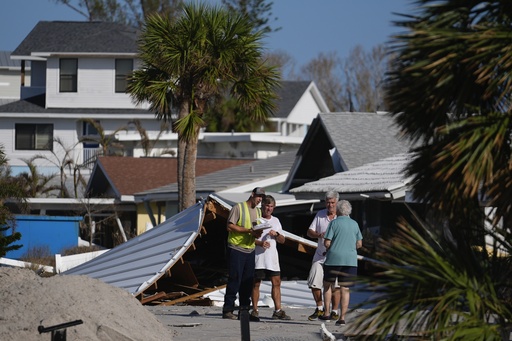
A new disaster relief initiative is set to assist nearly 1,000 households in Florida and North Carolina affected by recent hurricanes. This program, spearheaded by the nonprofit organization GiveDirectly, offers a unique approach to aid by providing direct cash payments rather than traditional relief methods.
On Friday, eligible households impacted by Hurricanes Helene and Milton will receive $1,000 each. GiveDirectly utilizes a specialized artificial intelligence tool developed by Google to identify regions with significant poverty and storm damage. On Tuesday, people living in these targeted areas were invited to join the program through a mobile app that manages government assistance programs like SNAP. Funds will be transferred via the app’s linked debit card.
According to Laura Keen, a senior program manager at GiveDirectly, this method aims to disperse aid efficiently and respectfully, allowing individuals to address their unique needs. Instead of navigating complex applications, recipients can determine their immediate requirements, thus promoting autonomy in their recovery.
While this approach may not reach every household in need, GiveDirectly aspires to lead a shift toward more rapid and effective disaster assistance. Keen noted that the organization continually seeks to increase the proportion of cash-based disaster responses. This is in contrast to the conventional flow of aid like clothing and food, which may not cover urgent needs such as temporary housing or childcare during school closures.
“The power of cash assistance is its flexibility, enabling individuals to satisfy their diverse requirements,” Keen observed. Additionally, prompt financial support can help shield those affected from predatory lenders and minimize credit card debts.
While GiveDirectly has employed direct cash assistance globally, it only began trialing this model for disaster relief within the U.S. during 2017, distributing funds to households impacted by Hurricane Harvey in Texas and Hurricane Maria in Puerto Rico. Back then, the process was more time-consuming, requiring in-person registration and the distribution of debit cards, taking several weeks to finalize.
Today, however, the organization can operate remotely and expedite the process to just days. A Google team leverages machine learning through its SKAI tool to analyze pre- and post-disaster aerial imagery, facilitating a belief of identifying the most affected areas. The chosen regions are cross-referenced with poverty statistics, enabling a targeted outreach through the Propel app, which encourages users in those localities to register.
Keen highlighted an important aspect of this system: “No lengthy documentation is needed to validate eligibility, as we can confirm their status seamlessly.”
However, the program’s focus on visibly damaged areas means that not all low-income families will receive aid, particularly undocumented individuals who may be unable to access government benefits altogether. Additionally, individuals without smartphones, which are necessary for app access, may be excluded from the relief effort. Propel only serves a fraction of the 41 million people enrolled in SNAP benefits, covering around 5 million.
In places like North Carolina, where power outages persist following Hurricane Helene, the lack of electricity renders smartphones useless without charging capabilities and connectivity. Keen acknowledged these limitations, indicating that a hybrid model combining remote and in-person assistance might help address some of these gaps.
As of now, GiveDirectly has garnered $1.2 million in fundraising for this initiative, including a $300,000 contribution from the Conrad N. Hilton Foundation. Despite the challenges, the organization hopes its model can inspire other cash assistance programs.
In January, FEMA revamped its cash aid program known as Serious Needs Assistance. The adjustments included raising the payment amount from $500 to $750, with the new fiscal year boosting that further. Furthermore, the requirement for states to initiate aid requests was eliminated. However, like GiveDirectly’s initiative, the FEMA program still necessitates participants to apply for benefits, which faced hurdles due to misinformation following Hurricane Helene. The financial assistance provided might not suffice in high-cost regions.
Chris Smith, a former manager at FEMA, indicated that technology could enhance the agency’s approach. “We need to open our minds to alternative methods for quickly assessing needs and establishing eligibility,” he said. Nonetheless, publicly funded programs often face stricter accountability and standards than philanthropic efforts, emphasizing a need for transparency in government assistance.
Historically, the government has also trialed other forms of unconditional cash assistance, such as the expanded child tax credit that provided monthly direct payments in 2021. This effort notably halved child poverty rates during its implementation, although it ultimately remained temporary.
Research conducted by the Center for Guaranteed Income reveals that recipients of guaranteed income programs typically allocate their funds towards essential expenses, emphasizing their acute understanding of personal budgeting amidst challenging circumstances. According to their studies, the majority of spending from these programs goes toward basic needs such as groceries, shelter, and transportation.
Keen expressed a desire for GiveDirectly to offer sustainable funding models, envisioning how prolonged financial aid could be more beneficial during recovery periods. Similar initiatives have occurred in the wake of two U.S. disasters; one instance involved a program funded by Dolly Parton that provided $1,000 per month for six months to those affected by forest fires in Tennessee. Moreover, Oprah and Dwayne Johnson’s People’s Fund of Maui offered monthly assistance to wildfire-impacted residents in 2023.
Keen concluded by emphasizing the importance of long-term assistance in fostering resilience among communities, stating that such an approach could help individuals to not only rebuild their lives but also safeguard against future emergencies.
